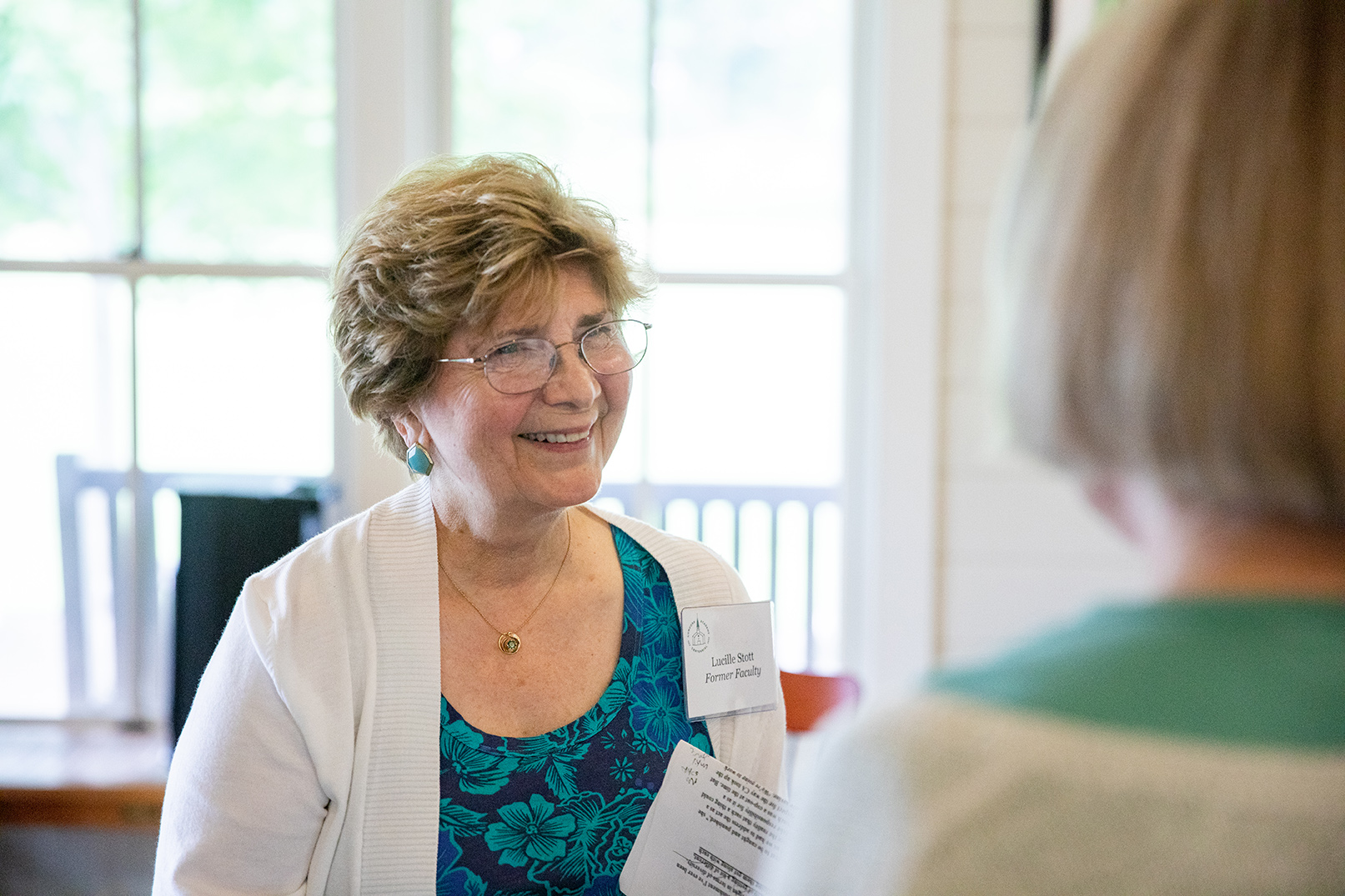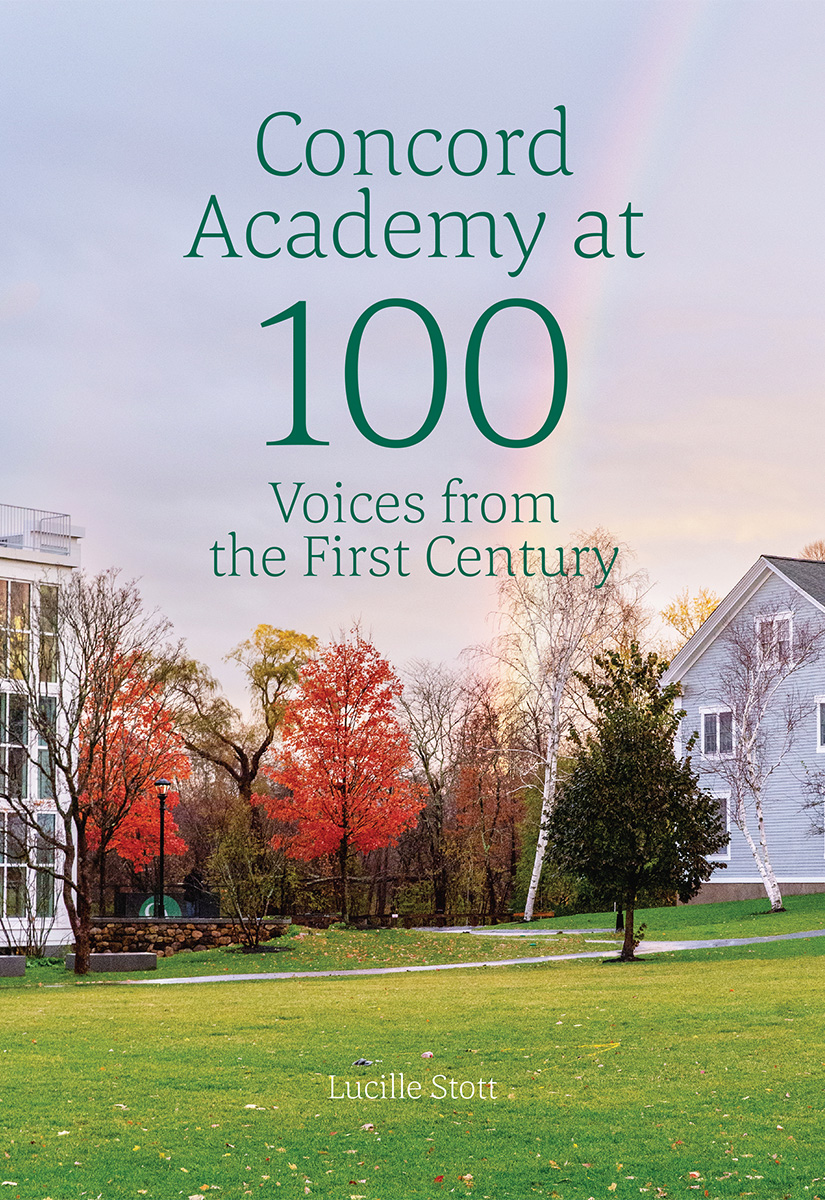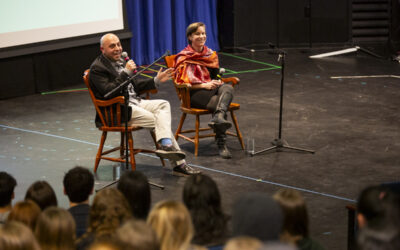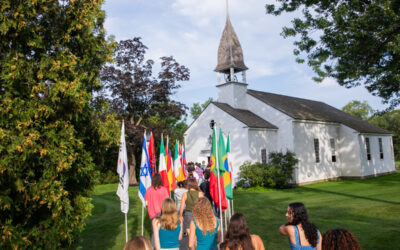
Lucille Stott speaks with CA alums about the book at Moriarty Athletic Campus in June 2022.
Centennial book author Lucille Stott shares CA’s stories

Between 2019 and 2022, retired faculty member and administrator Lucille Stott interviewed more than 300 CA students and alums ranging from the class of 1938 to the class of 2025 for her book Concord Academy at 100: Voices from the First Century, commissioned for CA’s Centennial and published this fall. They recounted memories of political protests and favorite traditions, unforgettable classroom moments, and eye-opening campus speakers. Here, Stott tells her own story to Nancy Shohet West ’84 for CA Magazine.
What were your first impressions of CA?
I interviewed at Concord in late fall of 1977 for a position as a spring semester sabbatical replacement. I wasn’t even sure I wanted to take on such a short-term commitment. But my mind changed in the one day I spent on campus. Students and faculty alike greeted me warmly as Department Head Ron Richardson introduced me around, and when I taught an advanced French literature class as part of my interview, I was amazed by the students’ active engagement. By the time I left campus that day, I knew I’d be deeply disappointed if I didn’t get the job.
How did those first impressions change?
My favorable impressions of the students and faculty proved to be accurate, but my perspective broadened in the years to come. After that first semester, I was given a permanent position as a teacher and house parent. Several years later, I took on roles in the administration: first academic dean, then acting head of school. Serving in those different positions gave me a wider lens on the school. I came to understand that the high level of teaching and learning we were doing was made possible by a group of administrators intent on managing CA’s limited resources and finding effective ways to ensure that students and faculty were supported in their quest to grow, work, and learn together. Once I gained that awareness, I never took the quality of the teaching life at CA for granted again.
You left CA in 1990 to work as a writer and editor, returned in 1999, and retired in 2014. When you think back over those five decades, are you more struck by how much changed or how much stayed the same?
I’ve been struck by how much remained the same despite the enormous changes. Though the village setting and river running through the campus always made it beautiful, the facilities were somewhat shabby when I arrived. There was a kind of unapologetic pride in not having the perfectly groomed appearance of other top-tier independent schools while still offering an amazing educational experience. The athletics program was also undersupported, and the residential facilities were not ideal. All that has changed for the better over the years. I don’t think the school would attract such top-notch students and faculty if the facilities had not been upgraded and the sports program brought into balance with academics and the arts. But through all the infrastructural and programmatic enhancements, what remains the same are the school’s underlying principles and beliefs and the simple, homelike atmosphere the founders hoped for. Alums talk about the high level of academic intensity, which they relished because of the shared joy in learning that always pervaded the campus. You hear students discussing course material in the hallways and at the lunch table. One day when I was teaching AP French literature, my students asked me if we could please read a little bit more Baudelaire before we moved on, and so we did. Years later, when I was teaching English, I invited a Shakespearean actor to visit class and talk about King Lear. When she unwittingly referred to Cordelia’s death, not realizing the students hadn’t yet reached the end of the play, the class’s reaction was one of collective visceral grief. That kind of devotion to learning is a timeless quality of the CA culture.
What did you learn in writing the Centennial book?
Through the interviews I heard wonderfully specific individual stories. I heard about students during World War II bringing their rationing books to school. I spoke with women from the 1950s who knew Elizabeth Hall as their headmistress. I learned about the first time a record was played during a senior chapel—it was the 8-minute version of “Light My Fire” by The Doors, in 1967. And, of course, I heard some stories of escapades and adventures that did not make it into the book! But what surprised me most was the degree of emotion with which alums recall their Concord Academy days. Sometimes the intensity of their recollections knocked me off my feet. And yet along with this poignancy, there was so much evident joy in the process of sharing their memories.
Concord Academy at 100: Voices from the First Century celebrates CA’s focus on both individuality and community throughout its first 100 years. Learn more and order a copy online here.


